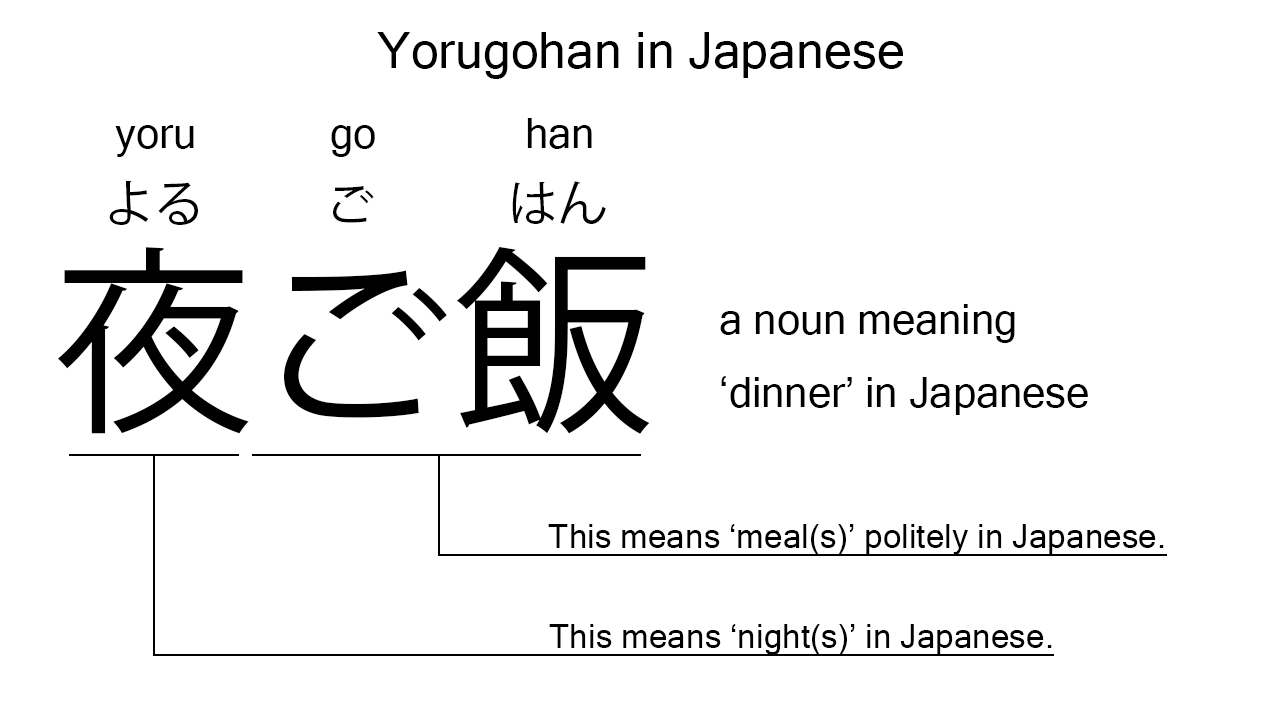What does “yorugohan” mean in Japanese?
Native speakers say “yorugohan” to mean ‘dinner’ in Japanese. Perhaps, some Japanese learners know this word as it is sometimes used in Japanese conversations. In this blog post, however, I will explain this word in detail based on its grammatical components. And also, I will explain how to use it through example sentences. My explanations would help Japanese learners understand “yorugohan” more clearly. Then, let’s get started!
Contents
Definition and meaning of “yorugohan”
Let me start with the definition and meaning of “yorugohan”.
- yorugohan – 夜ご飯 (よるごはん) : a noun meaning ‘dinner’ in Japanese.
The definition and meaning are simple and clear. To understand this noun more clearly, however, let me explain its components in detail, one by one.
What does “yorugohan” literally mean?
Grammatically, “yorugohan” consists of the following two components:
- yoru – 夜 (よる) : a noun meaning ‘night’ in Japanese.
- gohan – ご飯 (ごはん) : a noun meaning ‘meal’ in Japanese.
These two components tell us that “yorugohan” literally means a ‘night meal’ in Japanese. This literal interpretation is more or less in line with the actual meaning.

When we meet new Japanese words, we should check their components in detail to understand their meanings clearly and deeply. In many cases, grammatical components tell us a lot about the meanings of the words they form. Actually, here, we could get the better understanding of “yorugohan” through the detailed check above.
So far, I’ve explained the definition and meaning of “yorugohan” together with its grammatical components. Then, let me explain how to use it through the example sentences below.
Example #1: how to say “dinner” in Japanese
kinou doko de yorugohan wo tabe ta – 昨日何処で夜ご飯を食べた (きのうどこでよるごはんをたべた)
Where did you have dinner yesterday?
Below are the new words used in the example sentence.
- kinou – 昨日 (きのう) : a noun meaning ‘yesterday’ in Japanese. This can also work as an adverb almost anywhere in a sentence. In the example, this works as an adverb at the beginning of the sentence to say “yesterday” in Japanese.
- doko – 何処 (どこ) : an interrogative pronoun meaning ‘where’ in Japanese.
- de – で : a case particle used to say where someone does something. In the example, this is used after “doko” to ask where the listener had dinner yesterday.
- wo – を : a case particle used to make the object word in a sentence. In the example, this is used after “yorugohan” to make the object in the sentence.
- tabe – 食べ (たべ) : one conjugation of the verb, “taberu“, which means ‘to eat’ in Japanese. In the example, it has been conjugated for the better connection with its following word.
- ta – た : an auxiliary verb used after a verb, adjective, or auxiliary verb to make its past tense form. In the example, this is used after “tabe” to make its past tense form, “tabe ta”.
This is a typical usage of “yorugohan”. In this example, it works together with the case particle, “wo”, to become the object in the sentence.
Example #2: another usage of “yorugohan”
kon’ya issho ni yorugohan wo tabe you – 今夜一緒に夜ご飯を食べよう (こんやいっしょによるごはんをたべよう)
Let’s have dinner together tonight!
Below are the new words used in the example sentence.
- kon’ya – 今夜 (こんや) : a noun meaning ‘tonight’ in Japanese. This can also work as an adverb almost anywhere in a sentence. In the example, this works as an adverb at the beginning of the sentence to say “tonight” in Japanese.
- issho – 一緒 (いっしょ) : a noun meaning ‘same’, ‘being together’, or such in Japanese.
- ni – に : a case particle used to say how someone does something. In the example, this is used after “issho” to say “together” in Japanese.
- you – よう : an auxiliary verb used after a verb to make its volitional form. In the example, this is used after “tabe” to make its volitional form, “tabe you”.
This is another typical usage of “yorugohan”. When we want to say “dinner” in Japanese, this noun is always a very good option.
Summary
In this blog post, I’ve explained the definition and meaning of “yorugohan” in detail based on its grammatical components. And also, I’ve explained how to use it through the example sentences. Let me summarize them as follows.
- yorugohan – 夜ご飯 (よるごはん) : a noun meaning ‘dinner’ in Japanese. This consists of two parts, “yoru” and “gohan”, which mean ‘night’ and ‘meal’ respectively in Japanese. So, this noun literally means a ‘night meal’ in Japanese. This literal interpretation is more or less in line with the actual meaning.
Hope my explanations are understandable and helpful for Japanese learners.